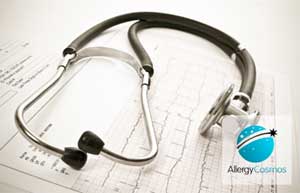Asthma has been very much on the medical research agenda in recent weeks, so we thought it was time to bring you an update on the latest findings on asthma:
- New findings from the West Sweden Asthma Study suggest that severe asthma may disguise itself as nasal congestion. Dr Jan Lötvall and his team, from the University of Gothenburg, asked 30,000 people about symptoms like a blocked nose, runny nose, wheezing, and breathlessness. He found that around 2% of the population of West Sweden actually had asthma, which was more than expected. The researchers noted that 60% of those suffering with asthma also reported some kind of nasal disease and nasal symptoms were more common among those with severe asthma. 'These findings suggest that some parts of the immune system that are activated in connection with chronic nasal problems might be linked to severe asthma,' said Lötvall. 'This insight could lead to new forms of treatment in the long run.' He believes the new study could lead to the identification of new subgroups of asthma and the relationships between asthma and other chronic conditions like rhinitis. Take home message? If you're worried about a chronically blocked nose, get it checked out thoroughly - it could be that you've actually got asthma.
- Wheezing and respiratory infections are more common among newborns with lower Vitamin D levels, according to a new study from the New Zealand Asthma and Allergy Cohort Study, which is following up more than 1,000 children in the cities of Wellington and Christchurch. During the first five years of life, the lower the vitamin D level at birth, the higher the risk of wheezing in the first five years. The wheezing generally came from chest infections. There was no link between low Vitamin D and increased risk of asthma at age five. So, even though low Vitamin D can do not cause asthma, it can certainly make it worse if it already exists. It may be that Vitamin D supplements can help here (although further research would be needed to confirm this) by protecting a child from infection, particularly during the months when sunlight levels are low since lack of sunlight exposure is a major factor in Vitamin D deficiency.
- New research in the Pediatrics journal suggests that babies given antibiotics in the first year of life are 12% more likely to develop asthma than babies not receiving antibiotics. The risk increased with the number of courses of antibiotics received. So babies receiving more than four courses of antibiotics had a 30% increased risk of asthma. The study was carried out by Dr Fawziah Marra and colleagues at the University of British Columbia. Dr Marra says. 'While I do not think this study means your child should not take antibiotics if they really need them, it may make you think twice about asking for them if your doctor doesn't prescribe them.'
- Finally, could breastfeeding increase the risk of your child developing an allergy? The World Health Organization recommends breastfeeding for six months before introducing solids. But researchers at University College London's Institute of Child Health now say this might not be the best approach. Put simply, they say the latest evidence suggests that earlier exposure to potential allergens, through solid foods, may be protective of allergy.
Sources - Journal Respiratory Research:
Lötvall J et al Multi-symptom asthma is closely related to nasal blockage, rhinorrhea, and symptoms of chronic rhinosinusitis-evidence from the West Sweden Asthma Study Respiratory Research 2010;11:163
Camargo C et al Cord-Blood 25-Hydroxyvitamin D Levels and Risk of Respiratory Infection, Wheezing, and Asthma
Pediatrics, Jan 2011; 127: e180 - e187
Marra F et al Antibiotic Use in Children Is Associated With Increased Risk of Asthma Pediatrics March 2009;123:1003-1010
Fewtrell M et al Six months of exclusive breastfeeding. How good is the evidence?
British Medical Journal 13 January 2011 http://www.bmj.com/content/342/bmj.c5955.full




